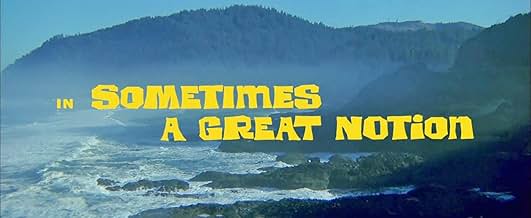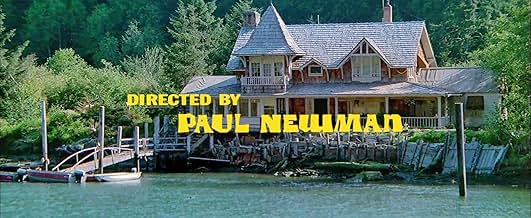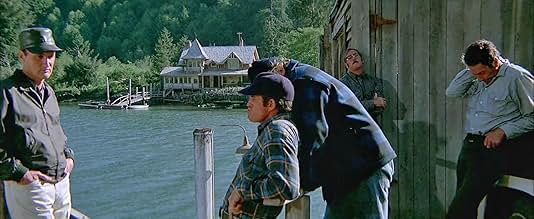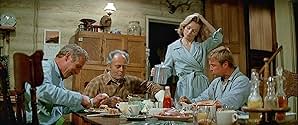IMDb-BEWERTUNG
6,9/10
4800
IHRE BEWERTUNG
Füge eine Handlung in deiner Sprache hinzuA family of fiercely independent Oregon loggers struggles to keep their family business alive amid changing times.A family of fiercely independent Oregon loggers struggles to keep their family business alive amid changing times.A family of fiercely independent Oregon loggers struggles to keep their family business alive amid changing times.
- Für 2 Oscars nominiert
- 2 Nominierungen insgesamt
Empfohlene Bewertungen
I have read Kesey's novel several times over the last 30 years or so. While I see some merit in this movie version, I'd like to see someone have another go at it. The movie only captures the novel in broad strokes. It hits the major point (brother returns to hometown to exact revenge on older sibling), but misses a lot of the flavor. I think Paul Newman, Henry Fonda and Lee Remick were perfect, as were many of the supporting cast. But Michael Sarrazin didn't quite do it for me. Maybe it was the hair, idunno. I always pictured a sort of geeky-looking, bespectacled, beatnick-looking guy with scruffy hair, but still fairly short, and sideburns. Sarrazin probably could have pulled it off, but back in the early 70s, actors were into looking like people from the early 70s.
But more to the point, the movie needed more back-story. We needed to see Johah Stamper "heading west" with young Henry and his brother. We needed to see Jonah fail and surrender to the dampness of the Pacific Northwest and desert his family. We needed to see young Henry take charge ("we're gonna whup her") and begin the logging business that becomes the crux of the story. Also missed were a lot of great scenes when Henry and Leland were children (Henry rescuing Leland from the Devil's Stovepipe, for one). Also missed was the passing of narrative from character to character. One small portion of the novel is actually narrated by a dog. The novel is written, mostly, in the first person from various points of view. There is a little second person narrative at the beginning of most chapters that pull the reader out of the story to offer additional flavor for the surroundings. Obviously, a novel needs to be pared in order to fit into the standard movie length. It would have to be a rather long movie, three hours or so, to portray the texture presented in the novel. But I'd like to see another go at it, maybe even starring Paul Newman as Henry.
But more to the point, the movie needed more back-story. We needed to see Johah Stamper "heading west" with young Henry and his brother. We needed to see Jonah fail and surrender to the dampness of the Pacific Northwest and desert his family. We needed to see young Henry take charge ("we're gonna whup her") and begin the logging business that becomes the crux of the story. Also missed were a lot of great scenes when Henry and Leland were children (Henry rescuing Leland from the Devil's Stovepipe, for one). Also missed was the passing of narrative from character to character. One small portion of the novel is actually narrated by a dog. The novel is written, mostly, in the first person from various points of view. There is a little second person narrative at the beginning of most chapters that pull the reader out of the story to offer additional flavor for the surroundings. Obviously, a novel needs to be pared in order to fit into the standard movie length. It would have to be a rather long movie, three hours or so, to portray the texture presented in the novel. But I'd like to see another go at it, maybe even starring Paul Newman as Henry.
A lot of people seem to be down on this film for reasons I really can't understand. The film seem to stretch everyone's creative levels especially one performer I'll single out later.
Henry Fonda plays the head of the Stamper clan who own a lot of acreage in Oregon timber country and the family business is cutting logs. Enough to survive, but they do it on their own. But a strike by timber union loggers causes enmity between them and the Stampers who are seen as scabs.
There are some similarities between Fonda's character and the family patriarch he played in Spencer's Mountain. But whereas Spencer had a noble dignity to him, Ben Stamper is a dissolute old cuss who has enjoyed all the vices known and imparted a love for them unto his children. They would be half brothers Paul Newman and Michael Sarrazin who've also got issues between themselves that may prevent the Stampers from forming a united front.
Newman directed the film and he had a good eye for the scenery of the Oregon logging country. And he got some good performances from the rest of the cast. One of them Richard Jaeckel got his career role as a Stamper cousin. Newman reached his creative heights in Jaeckel's death scene which was played between him and Jaeckel. It's a long drawn out affair for reasons you'll know if you see the film. It will stay with you forever as it has me since I saw the film when it first came out. Richard Jaeckel got a nomination for Best Supporting Actor and the pity is that he was up against another popular character actor in Ben Johnson who won for The Last Picture Show.
Sometimes A Great Notion also got a second Oscar nomination for Best Song with We're All His Children by Henry Mancini and Alan and Marilyn Bergman. Bing Crosby recorded a fine version of it on one of his albums. It lost however to theme from Shaft.
Paul Newman deserved a lot more credit for this film than he got. I think if you see Sometimes A Great Notion you'll agree.
Henry Fonda plays the head of the Stamper clan who own a lot of acreage in Oregon timber country and the family business is cutting logs. Enough to survive, but they do it on their own. But a strike by timber union loggers causes enmity between them and the Stampers who are seen as scabs.
There are some similarities between Fonda's character and the family patriarch he played in Spencer's Mountain. But whereas Spencer had a noble dignity to him, Ben Stamper is a dissolute old cuss who has enjoyed all the vices known and imparted a love for them unto his children. They would be half brothers Paul Newman and Michael Sarrazin who've also got issues between themselves that may prevent the Stampers from forming a united front.
Newman directed the film and he had a good eye for the scenery of the Oregon logging country. And he got some good performances from the rest of the cast. One of them Richard Jaeckel got his career role as a Stamper cousin. Newman reached his creative heights in Jaeckel's death scene which was played between him and Jaeckel. It's a long drawn out affair for reasons you'll know if you see the film. It will stay with you forever as it has me since I saw the film when it first came out. Richard Jaeckel got a nomination for Best Supporting Actor and the pity is that he was up against another popular character actor in Ben Johnson who won for The Last Picture Show.
Sometimes A Great Notion also got a second Oscar nomination for Best Song with We're All His Children by Henry Mancini and Alan and Marilyn Bergman. Bing Crosby recorded a fine version of it on one of his albums. It lost however to theme from Shaft.
Paul Newman deserved a lot more credit for this film than he got. I think if you see Sometimes A Great Notion you'll agree.
The date i don't remember, but the day I do. what i did that day i should say. and the movie is still vividly in my mind. I can see the family interplay pretty clearly, but there is 1 scene clearer then all the others.
And more worried about creating a spoiler,
i will only describe it in general terms.
And that is the Death Scene in the picture, I don't want to mention the players in the scene for fear of spoiling it for others. it isn't a short scene, it felt like an eternity, for me anyway.
It is heart wrenching, and has haunted me all these years.
I would like to see this picture again to feel that emotion again.even now just talking around it i feel emotions welling up in me.
worthwhile movie I would recommend it for anyone.
And more worried about creating a spoiler,
i will only describe it in general terms.
And that is the Death Scene in the picture, I don't want to mention the players in the scene for fear of spoiling it for others. it isn't a short scene, it felt like an eternity, for me anyway.
It is heart wrenching, and has haunted me all these years.
I would like to see this picture again to feel that emotion again.even now just talking around it i feel emotions welling up in me.
worthwhile movie I would recommend it for anyone.
Definitely an old school movie where the drama is tied up in day to day living. No great examinations just a family trying to go about their own business and the impacts that their choices have on themselves and their community.
Fonda is great and Newman just looks like he has been logging his entire life, super convincing.
The conflicts within the family are frequent but they never allow them to go too far, family is family.
It won't knock your socks off but its a nice film :)
Fonda is great and Newman just looks like he has been logging his entire life, super convincing.
The conflicts within the family are frequent but they never allow them to go too far, family is family.
It won't knock your socks off but its a nice film :)
Sometimes a Great Notion (1970)
This is an amazing story, with some harrowing scenes and really terrific acting. And it's based on a Ken Kesey novel that is one of my favorite books, a sprawling, difficult, layered up masterpiece of some kind, for its time at least, and for when I read it as a 20 year old looking for meaning in life. There are so many threads in the book, powerful themes and small ones, that get interwoven into a vivid, unashamed adventure-romance with interior explosions and characters clashing with nature and cultures clashing of cultures, it's really impossible to make a movie out of it.
But Paul Newman, as lead character and, yes director (stepping in when the original director left), has tried. The result is grossly unappreciated, because the strengths here make the flaws bearable. The flaws are clear. The casting is uneven. Lee Remick is a character from another movie plopped into this rough and tumble Oregon backwoods scene, and the second leading man, a kind of implied narrator to it all, is played by little known Michael Serrazin, a pretty boy who holds his own but is uninspiring.
Furthermore, the filming is straight on and meant to show what is happening more than contribute to the ambiance of the experience. There are scenes of machinery and logging that are impressive in their raw scale and masculinity, for sure, but that is partly fast editing at work, and amazing subject material. The rainy coastal landscape, the rambling house on the river, even the dirt bike race and the scenes of the little town all make you yearn for more intensity and involvement, visually.
The music by Henry Mancini shows the strain of this amazing composer as he moves from the light orchestral work he did in the 1960s ("Moon River," "Pink Panther," "Days of Wine and Roses," etc.) to something embracing country, rock and roll, and contemporary music being used so effectively in New Hollywood films. It's halfway there, but gives a falseness to some of the scenes that gets in the way of the gritty, emotional drama to it all.
And I mean emotional. Some have criticized Kesey's novel for overachieving. It tries to deal with every big issue there is in one book: individualism and love, above all, but a highly dysfunctional family, the new America of college and drugs vs. the old one of hard work and croneyism, raw beauty in the landscape vs. exploiting nature for commercial gain, and loyalty to family in all its layers of father and sons, sons and lovers, and workers as part of extended family. But that's what makes the book and the movie terrific. The scenes here of Newman doing anything, of Henry Fonda playing the tough as nails dad, and of some of the side actors in their rough daily working roles in the woods are right on. The hospital scene with Newman and Fonda is a small gem, and the famous scene of Newman trying to free his little brother (played by Richard Jaeckel) caught under a log under water is utterly unforgettable. Utterly.
There is a lot of filler her, lots of falling trees and bikers racing and a building of the toughness of this manly world. But hang in there for the other stuff. And read the book.
This is an amazing story, with some harrowing scenes and really terrific acting. And it's based on a Ken Kesey novel that is one of my favorite books, a sprawling, difficult, layered up masterpiece of some kind, for its time at least, and for when I read it as a 20 year old looking for meaning in life. There are so many threads in the book, powerful themes and small ones, that get interwoven into a vivid, unashamed adventure-romance with interior explosions and characters clashing with nature and cultures clashing of cultures, it's really impossible to make a movie out of it.
But Paul Newman, as lead character and, yes director (stepping in when the original director left), has tried. The result is grossly unappreciated, because the strengths here make the flaws bearable. The flaws are clear. The casting is uneven. Lee Remick is a character from another movie plopped into this rough and tumble Oregon backwoods scene, and the second leading man, a kind of implied narrator to it all, is played by little known Michael Serrazin, a pretty boy who holds his own but is uninspiring.
Furthermore, the filming is straight on and meant to show what is happening more than contribute to the ambiance of the experience. There are scenes of machinery and logging that are impressive in their raw scale and masculinity, for sure, but that is partly fast editing at work, and amazing subject material. The rainy coastal landscape, the rambling house on the river, even the dirt bike race and the scenes of the little town all make you yearn for more intensity and involvement, visually.
The music by Henry Mancini shows the strain of this amazing composer as he moves from the light orchestral work he did in the 1960s ("Moon River," "Pink Panther," "Days of Wine and Roses," etc.) to something embracing country, rock and roll, and contemporary music being used so effectively in New Hollywood films. It's halfway there, but gives a falseness to some of the scenes that gets in the way of the gritty, emotional drama to it all.
And I mean emotional. Some have criticized Kesey's novel for overachieving. It tries to deal with every big issue there is in one book: individualism and love, above all, but a highly dysfunctional family, the new America of college and drugs vs. the old one of hard work and croneyism, raw beauty in the landscape vs. exploiting nature for commercial gain, and loyalty to family in all its layers of father and sons, sons and lovers, and workers as part of extended family. But that's what makes the book and the movie terrific. The scenes here of Newman doing anything, of Henry Fonda playing the tough as nails dad, and of some of the side actors in their rough daily working roles in the woods are right on. The hospital scene with Newman and Fonda is a small gem, and the famous scene of Newman trying to free his little brother (played by Richard Jaeckel) caught under a log under water is utterly unforgettable. Utterly.
There is a lot of filler her, lots of falling trees and bikers racing and a building of the toughness of this manly world. But hang in there for the other stuff. And read the book.
Wusstest du schon
- WissenswertesThis was the first film ever shown on HBO when the service premiered in 1972.
- PatzerIn the fox-hunt scene, when the fox jumps over the fence, it becomes apparent that the fox is wearing a 1/4" black collar with a little tiny bell on it.
- Zitate
Hank Stamper: [singing] Don't ever hit your mother with a shovel. It will leave a dull impression on her mind. Paul Newman said the same line in "Butch Cassidy and the Sundance Kid".
- Alternative VersionenIn the earliest video release version, circa 1982, when Leland first arrives, a crane shot reveals Hank looking down below at the family reunion. In the most current VHS release, circa 1994, the crane shot is edited out and replaced with just a single cut from Viv, with an audio bridge to Hank on the roof.
- VerbindungenFeatured in Salut für ...: Salut für Henry Fonda (1978)
- SoundtracksAll His Children
Lyrics by Marilyn Bergman and Alan Bergman
Music by Henry Mancini
Sung by Charley Pride
Top-Auswahl
Melde dich zum Bewerten an und greife auf die Watchlist für personalisierte Empfehlungen zu.
- How long is Sometimes a Great Notion?Powered by Alexa
Details
Box Office
- Budget
- 3.660.000 $ (geschätzt)
- Laufzeit1 Stunde 54 Minuten
- Seitenverhältnis
- 2.35 : 1
Zu dieser Seite beitragen
Bearbeitung vorschlagen oder fehlenden Inhalt hinzufügen


































